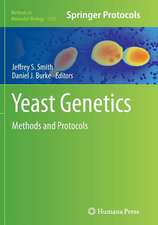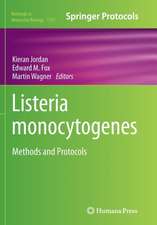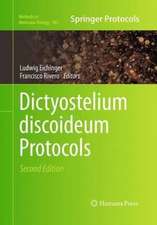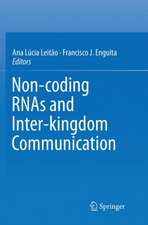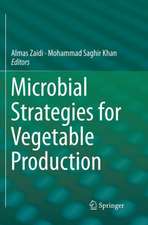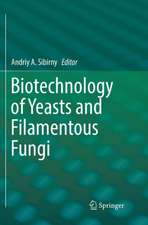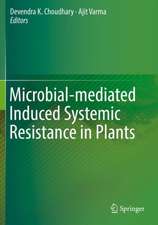Molecular Mechanisms in Yeast Carbon Metabolism
Editat de Jure Piškur, Concetta Compagnoen Limba Engleză Hardback – 19 mai 2014
| Toate formatele și edițiile | Preț | Express |
|---|---|---|
| Paperback (1) | 946.41 lei 6-8 săpt. | |
| Springer Berlin, Heidelberg – 3 sep 2016 | 946.41 lei 6-8 săpt. | |
| Hardback (1) | 958.25 lei 6-8 săpt. | |
| Springer Berlin, Heidelberg – 19 mai 2014 | 958.25 lei 6-8 săpt. |
Preț: 958.25 lei
Preț vechi: 1168.60 lei
-18% Nou
Puncte Express: 1437
Preț estimativ în valută:
183.36€ • 191.07$ • 151.82£
183.36€ • 191.07$ • 151.82£
Carte tipărită la comandă
Livrare economică 03-17 aprilie
Preluare comenzi: 021 569.72.76
Specificații
ISBN-13: 9783642550126
ISBN-10: 3642550126
Pagini: 336
Ilustrații: VIII, 326 p. 42 illus., 28 illus. in color.
Dimensiuni: 155 x 235 x 24 mm
Greutate: 0.81 kg
Ediția:2014
Editura: Springer Berlin, Heidelberg
Colecția Springer
Locul publicării:Berlin, Heidelberg, Germany
ISBN-10: 3642550126
Pagini: 336
Ilustrații: VIII, 326 p. 42 illus., 28 illus. in color.
Dimensiuni: 155 x 235 x 24 mm
Greutate: 0.81 kg
Ediția:2014
Editura: Springer Berlin, Heidelberg
Colecția Springer
Locul publicării:Berlin, Heidelberg, Germany
Public țintă
ResearchCuprins
Introduction to Carbon Metabolism in Yeast.- Glucose Sensing and Signal Transduction in Saccharomyces cerevisiae.- Anaerobic Carbon Metabolism of Saccharomyces cerevisiae.- Systems Biology: Developments and Applications.- Comparative Genomics and Evolutionary Genetics of Yeast Carbon Metabolism.- Similarities and Differences Between Cancer and Yeast Carbohydrate Metabolism.- Carbon Metabolism in Pathogenic Yeasts (Especially Candida): The Role of Cell Wall Metabolism in Virulence.- Molecular Mechanisms in Yeast Carbon Metabolism: Lipid Metabolism and Lipidomics.- Molecular Mechanisms in Yeast Carbon Metabolism: Bioethanol and Other Biofuels.- Wine, Beer and Cider: Unravelling the Aroma Profile.- Production of Metabolites and Heterologous Proteins.
Textul de pe ultima copertă
This book provides a comprehensive review of recent developments and achievements in the field of yeast carbon metabolism, from academic studies on gene expression to biotechnology-relevant aspects.
Yeast is one of the most widely studied laboratory organisms and represents one of the most essential models for understanding how any eukaryote cell works. On the other hand, yeast fermentations have for millennia provided us with a variety of biotech products, like wine, beer, vitamins, and recently also with pharmaceutically active heterologous products and biofuels. A key biochemical activity in the yeast cell is the metabolism of carbon compounds, which provides energy for the whole cell, as well as precursors for any of the final fermentation products. A complex set of genes and regulatory pathways control the metabolism of carbon compounds, from nutrient sensing and signal transduction to transcription regulation and post-transcriptional events. Recent advances in comparative genomics and the development of post-genomic tools have provided further insights into the network of genes and enzymes, and into the molecular mechanisms which are responsible for a balanced metabolism of carbon compounds in the yeast cell, and which could be manipulated in the laboratory to increase the yield and quality of yeast biotech products.
Yeast is one of the most widely studied laboratory organisms and represents one of the most essential models for understanding how any eukaryote cell works. On the other hand, yeast fermentations have for millennia provided us with a variety of biotech products, like wine, beer, vitamins, and recently also with pharmaceutically active heterologous products and biofuels. A key biochemical activity in the yeast cell is the metabolism of carbon compounds, which provides energy for the whole cell, as well as precursors for any of the final fermentation products. A complex set of genes and regulatory pathways control the metabolism of carbon compounds, from nutrient sensing and signal transduction to transcription regulation and post-transcriptional events. Recent advances in comparative genomics and the development of post-genomic tools have provided further insights into the network of genes and enzymes, and into the molecular mechanisms which are responsible for a balanced metabolism of carbon compounds in the yeast cell, and which could be manipulated in the laboratory to increase the yield and quality of yeast biotech products.
Caracteristici
Insights into the network of genes and enzymes and molecular mechanisms balancing the metabolism of carbon compounds in the yeast cell Yeast is a pioneering model and the field of carbon metabolism is interesting for anyone working with cell factories Written by the leading scientists in the field, thus providing a first quality of the up-to-date status Includes supplementary material: sn.pub/extras





